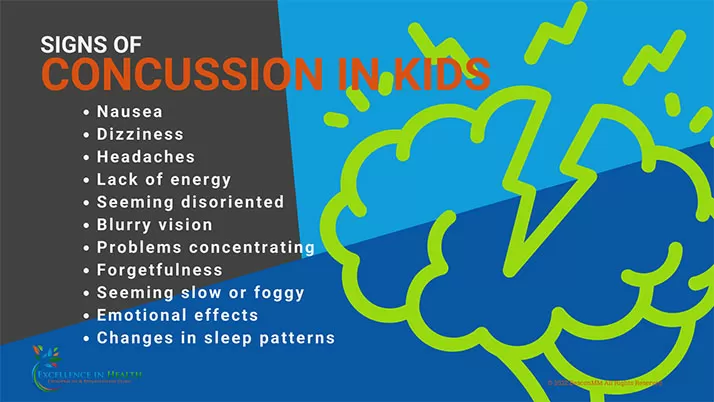Concussions in Youth Sports: Prevention, Diagnosis, and Treatment

Sports programs provide young people with many opportunities to explore their interests, challenge their minds, and strengthen their bodies. However, as a parent, you need to be aware of the possibility of a youth sports concussion. Here's a brief parent's guide to concussions in sports, including concussion statistics, signs of concussion, how to prevent concussions, and the basics of concussion treatment.
Do you suspect your child athlete has a concussion? Call EIH for the optimal youth sports concussion treatment.
Facts about Youth Sports Concussions
Knowing when your child is at greater risk of concussion can help you focus on prevention and being aware of the signs. The following are some of the facts you may want to know about concussions in youth sports.
How Common Are Concussions in Youth Sports?
A study published by the NIH found that about 12.1% of youth athletes experience a concussion at some point.
Which Kids Are Most at Risk of Concussions?
The previously-mentioned NIH study also found the risk for certain groups is higher than for others. For example, 18-year-olds are twice as likely to get concussions than 13-year-olds. As for gender, girls have a 1.5 times higher risk of getting a concussion than boys in comparable sports. What's more, if a young person has already had one concussion, they are 3-5 times more likely to have another one.
Does Age Play a Role in Recovery from Concussions?
Yes, age does seem to play a role in the speed of recovery from a concussion in youth sports.
In another study from NIH, researchers found that student-athletes aged 13-16 recovered more slowly than their 18 to 22-year-old counterparts.
The average number of days the younger group took to recover their baseline processing speed was 6.8 days, while the average for the older group was 5.3 days. The younger kids' verbal memory took 7.2 days to return to their baseline, while the older group only took 4.7 days. When scored on the post-concussion scale, the mean number of days for the younger group to recover was 8.1 days, while the mean for the older group was just 6.1 days.
In Which Sports Do Concussions Most Commonly Happen?
It might not surprise you to learn that concussions tend to happen more often in high-contact sports. Which sports make the list? The three with the greatest risk are rugby, ice hockey, and football. With high but slightly lower risk, you will find lacrosse, soccer, and wrestling next on the list.
What Are the Signs of Concussion in Kids?

If your child becomes unconscious after a blow to the head, they should get immediate concussion care. Other signs they urgently need attention include if they appear confused, lethargic, are vomiting, or have an unusually severe headache.
In addition, you might notice the other symptoms of a concussion in youth sports. You can ask your child what they are experiencing, but it's best if you also watch for cognitive and behavioral changes. Here are some signs your child might exhibit if they have a concussion.
- Nausea
- Dizziness
- Headaches
- Lack of energy
- Seeming disoriented
- Blurry vision
- Problems concentrating or paying attention
- Forgetfulness
- Seeming slow or foggy
- Emotional effects of a concussion, like anxiety, depression, or irritability
- Changes in sleep patterns, such as sleeping less or being extremely sleepy
Immediate medical attention is best, but you might not always notice the signs right away. That's why it's a good idea to be aware of the concussion symptoms, especially if your child had a blow to the head or a hard fall. If you suspect they do, even after some time has passed, make sure they get a diagnosis and treatment as soon as possible.
How Are Concussions Diagnosed?
If your child has had a hard blow to their head or body, your chiropractor can determine if the youth has a concussion. They may ask about the incident that might have caused a concussion. Also, they may ask both you and your child what symptoms you've noticed.
Finally, the doctor may do tests to find out the extent of the injury. These tests can include physical tests, such as MRI or CT scan, to make sure there is no brain bleeding or swelling, and the DANA test used to assess cognitive function.
How Can Concussions Be Prevented?
Although there's no way to guarantee that a youth athlete will never have a concussion, there are things you can do to decrease their risk. Here are some tips for youth concussion prevention.
- Talking about concussions. Have a talk with your child about symptoms, encouraging them to tell you or another adult if they notice anything.
- Teaching heads-up tackling techniques. Request that the coach teaches your child heads-up tackling techniques to minimize the danger of concussion.
- Avoiding collisions and helmet clashes. Teach your child to be careful about colliding with another player. Remind your child not to make helmet-to-helmet contact.
- Enforcing rules. Many rules of sports are designed to prevent injury. Therefore, be sure the coaches and referees enforce those rules.
- Lead with the trunk. In soccer, kids should move the trunk of their body forward first.
- Pre-season testing. Although pre-season testing does not keep your child from getting a concussion, it aids the process of treatment and recovery if they do. This helps us provide complete treatment because we know when your child is back to their baseline level of physical and cognitive health.
If a child does have a head injury, they should be taken out of the game immediately. Then, they should be evaluated in case they need youth sports concussion treatment.
Concussion Treatment for Kids in Sports
At Excellence in Health Chiropractic and Rehab Clinic, we offer the best in youth sports concussion treatment. We participate in a special partnership program with Complete Concussion Management, Inc. (CCMI) to bring evidence-based concussion care to kids and people of all ages.
In the first stage of treatment, your child needs rest more than anything else. They may need to rest both their body and their mind for up to 48 hours. After this, we assist your child in gradually increasing their activity through our rehabilitation program.
Through our partnership with CCMI, we provide complete concussion care that includes testing throughout treatment to recognize ongoing symptoms so that your child can return to sports only when they are ready.
Cognitive testing aims to ensure the child regains their usual ability to process information and think as clearly and effectively as ever. Our youth sports concussion treatment helps your child get back to their peak balance, vision, and reaction time. Through therapeutic exercise and diet adjustments, we facilitate your child's recovery and enhance their overall health.
If your child's concussion is among the 30% of concussions that lead to Post Concussion Syndrome, we continue with tests and examinations to find out why they are continuing to have concussion symptoms. In addition to our expert chiropractic care for concussions, we provide educational resources for you and your family. Research evidence shows that the faster an athlete is seen by a concussion trained health care provider, the faster they get better and are cleared to return to their sport.
Our team at Excellence in Health provides the best chiropractic care for your child to have a healthy, happy experience with sports. With Dr. William Ross and Dr. Blue Ross leading our clinic, you can be sure that your child is well-taken care of during sports season and all year round.
Looking for concussion treatment for your sports-loving child? Contact EIH to get complete care for concussions in youth sports.

Excellence In Health Chiropractic & Rehabilitation Clinic
2008 E Northern Lights Blvd #100
Anchorage, AK 99508

